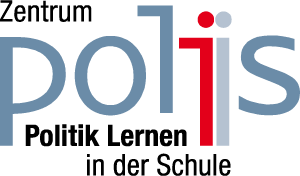Competence-oriented teaching
With its activities on offer polis supports competence-oriented teaching. The aim is to enhance self-reflective and reflective civic awareness of learners.
In this regard, it is not primarily a question of the acquisition of the broadest possible range of knowledge, but of learning activities which enable a student to learn about, think about and deal with political themes. The activities are therefore linked to the lives and experiences of the students themselves.
In the field of citizenship education efforts are being made to impart the following competencies (abilities and a willingness to find solutions to problems independently):
- concept competence
- method competence
- modeling competence
- decision-making competence
These four competences are trained by means of examples of content. However, the specific working knowledge necessary for this will not dominate the learning process, but will rather have an instrumental character.
The aim is to develop the political maturity of learners, which enables their integration into democratic and political life without third-party guidance – e.g. by means of the ability to stand up for one’s beliefs or to perceive responsibility as a voter.
